Our Faculty and Staff
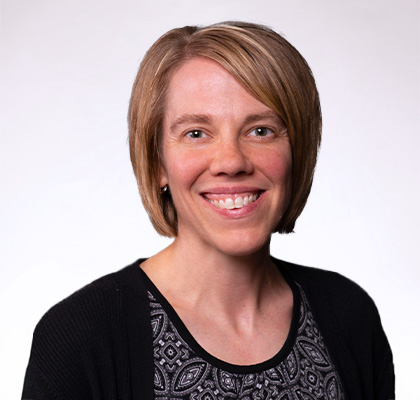
Holly Dolliver
Department Chair, Plant and Earth Science; Professor, Soil Science and Geology
Office: 310 Ag Science Building
Phone: 715-425-4136
Email: holly.dolliver@uwrf.edu
Professional Information
Education:
B.S., North Dakota State University (Soil Science/Geology)
M.S., University of Minnesota (Soil Morphology)
Ph.D., University of Minnesota (Soil Physics)
Classes Taught:
SOIL 120: Introductory Soil Science
SOIL 250: Soil Profile Descriptions
SOIL 350: Soil Development
SOIL 380: Soil Judging
SOIL 460: Soil Physical Properties and Environmental Quality
GEOL 101: Introductory Geology
GEOL 150: Geological Perspectives of Global Change
GEOL 327: Geomorphology and Glacial Geology
Professional Bio:
Dr. Holly Dolliver is a passionate educator who is deeply committed to the power of higher education and the mission of primarily undergraduate institutions. She focuses on creating authentic learning experiences through novel teaching approaches and mentoring students in field, judging, research and other high impact experiences. Her research interests include the effects of land use and land management practices on soil quality, carbon sequestration, nutrient/contaminant transport and the geology/geomorphology of western Wisconsin. She is extensively engaged in community service and outreach where she shares her love of the local geology and natural history. Holly grew up on a small farm in central Minnesota, which cultivated her lifelong interest in the natural environment and is a first-generation college student. She is the recipient of the 2011 Keith Wurtz Award for innovation in teaching, 2016 Adviser of the Year and 2016 Outstanding Faculty Award from the College of Agriculture, Food and Environmental Sciences.
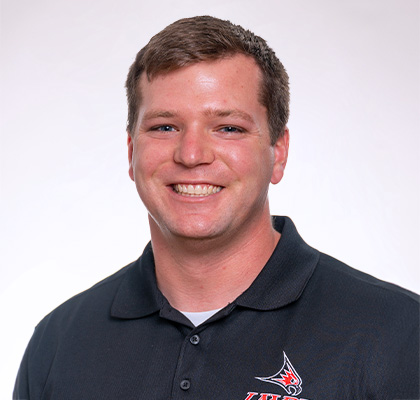
Brandt Berghuis
Assistant Professor, Crop Science
Office: 308 Ag Science Building
Phone: 715-425-4890
Email: brandt.berghuis@uwrf.edu
Professional Information
Education:
B.S., North Dakota State University (Crop and Weed Science-Biotechnology)
College Teaching Certificate, North Dakota State University
Ph.D., North Dakota State University (Plant Pathology)
Courses Taught:
PLSC 161: Introduction to Plant Science
CROP 260: Plant and Seed Identification
CROP 285: Seminar
BIOL 314: Introduction to Plant Pathology
CROP 345: Weed Control
CROP 451: Integrated Pest Management
Professional Bio:
I have a passion for teaching and working with undergraduate students. In the classroom, I prioritize hands-on experiential learning that equips students for their future careers. Outside of the classroom, I lead an applied plant pathology laboratory that engages in undergraduate research. The direction of my research interests includes evaluating management strategies to better manage plant diseases in various cropping systems. Recent projects include screening genetic resistance for disease management, surveying pathogen and weed populations, and evaluating the efficacy of foliar and seed treatment fungicides. I have authored refereed publications (4) and proceedings publications (4).
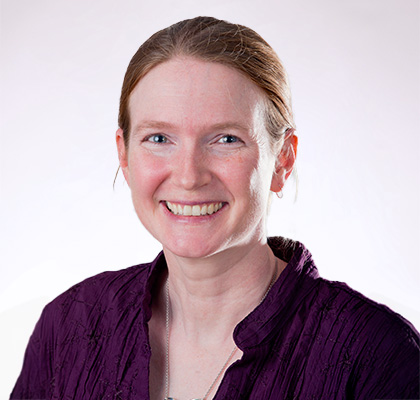
Jill Coleman Wasik
Professor, Environmental Science
Office: 301 Ag Science Building
Phone: 715-425-4106
Email: jill.colemanwasik@uwrf.edu
Professional Information
Education:
B.A., University of Minnesota-Morris (Biology)
M.S., University of Minnesota (Water Resources Science – Environmental Chemistry)
Ph.D., University of Minnesota University (Water Resources Science - Hydrology)
Courses Taught:
ESM 105: Introduction to Environmental Studies
ESM 220: Environmental Sustainability: Theory, Issues, and Management
ESM 303: Environmental Policies and Administration
ESM 305: Environmental Impact Assessment
ESM 412: Chemical Fate and Transport in the Environment
ESM 413: Environmental Analysis
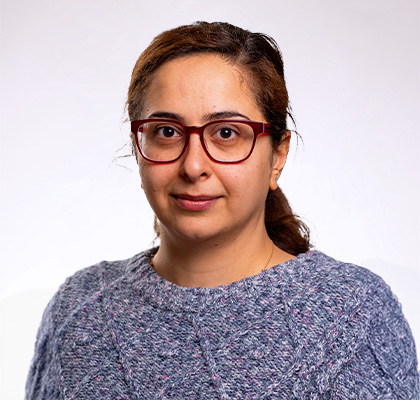
Bahareh Hassanpour
Assistant Professor, Environmental Science and Engineering
Office: 316 Ag Science Engineering Building
Phone: 715-425-4791
Email: bahareh.hassanpour@uwrf.edu
Professional Information
Education:
B.S., Urmia University (Agricultural Engineering-Water Engineering)
M.S., University of Tehran (Irrigation and Drainage)
M.S., Cornell University (Environmental Engineering)
Ph.D., Cornell University (Environmental Engineering)
Courses Taught:
ENVN 280: Activities in Environmental Engineering
ENVN 330: Applied Engineering Hydrology
ENVN 430: Water Quality Modeling
ESM 360: Hydrology and Water Quality
Professional Bio:
Dr. Hassanpour’s area of expertise is agricultural water management and quality. Her research interests include remediation of non-point source pollution, water quality, nutrient cycling and the fate and transport of contaminants. She has been awarded a National Science Foundation grant, in collaboration with Dr. Coleman Wasik, to study carbon and nitrogen cycling in agricultural soils.
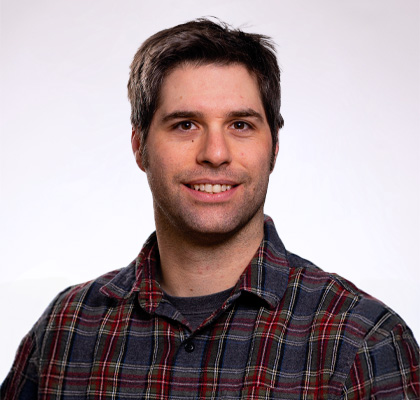
Andrew Haveles
Assistant Professor, Biology and Geology
Office: 402 Ag Science Building
Phone: 715-425-4662
Email: andrew.haveles@uwrf.edu
Professional Information
Education:
B.S., Syracuse University (Biology -Ecology)
M.S., Syracuse University (Earth Sciences)
Ph.D., University of Minnesota (Earth Sciences)
Courses Taught:
BIOL 103: Biological Evolution
BIOL 150: General Biology
BIOL 230: General Zoology
BIOL 454: Mammalogy
GEOL 101: Introduction to Geology
GEOL 102: Introduction to Geology Lab
GEOL 150: Geological Perspectives of Global Change
GEOL 362: Sedimentology and Stratigraphy
GEOL 377 Northeast Regional Geology Fieldtrip
GEOL 450: Paleontology
Professional Bio:
My goal as an educator is to create an inclusive, dynamic and equitable classroom that provides base knowledge, develops quantitative and communication skills and inspires students to follow their inquisitive nature through open inquiry and critical thinking. I strive to achieve these goals everyday by utilizing evidence-based practices, a diversity of pedagogical tools and encouraging students to participate in their learning through inquiry-based activities and conducting primary research.
Research Interests:
My research focuses on illuminating the processes and interactions that shape and record patterns of biodiversity. My team and I investigate modern ecology paleoecology and paleoenvironmental questions using biogeochemical data, geospatial data and the fossil record. Recent work used stable isotopes to investigate food resource partition by small mammals in response to environmental change today and over the last 4 million years in the Great Plains.
For more information about student opportunities, research, teaching and fun, visit: andrewhaveles.weebly.com/.
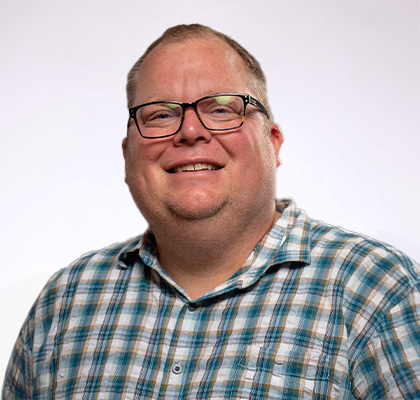
Christopher Holtkamp
Associate Professor, Community and Environmental Planning; Certified Planner, American Institute of Certified Planners (AICP)
Office: 304 Ag Science Building
Phone: 715-425-4158
Email: christopher.holtkamp@uwrf.edu
Professional Information
Education:
B.A., University of Texas Austin (Geography)
M.A., University of Denver (Geography)
Ph.D., Texas State University (Geography)
Courses Taught:
ESM 107: Planning for a Sustainable Society
ESM 151: Intro to Land Use Theory and Practice
ESM 218: International Experience in Resilience Planning
ESM 308: Sustainable Urban Design
ESM 318: Resilience Planning for Natural Hazards
ESM 325: Planning for Public Lands and Open Space
ESM 351: Planning for Sustainable Communities
ESM 411: Site Planning and Development
GEOG 322: Urban Geography
HON 191: Honors Seminar
HON 497: Honors Capstone Seminar
Professional Bio:
I bring over 20 years of experience as a practicing urban planner to my teaching at UWRF and strive to incorporate a practical approach to my courses. I want students to recognize the connection between what they are learning in the classroom to applications in their future careers. My teaching leverages my practical experience by incorporating practical class projects and work to allow students to develop skills that will make them more effective community planners. I am also involved in community projects providing planning assistance to communities that include opportunities for student involvement for their professional development gaining real world experiences.
My research focus is on the role of social capital in developing community sustainability across social, economic and environmental pillars. My dissertation addressed the relationship of social capital to economic vitality in the Appalachian region and I am currently involved in projects exploring social capital in the dairy industry in Wisconsin. Another interest is the concept of place and how it is defined and expressed. This includes how places are defined by particular products (such as bourbon and Kentucky), place names, cultural identifiers, place names, etc. Finally, I also research housing production and access, looking at regulations and policies that impact this area to address barriers that are limiting housing availability.
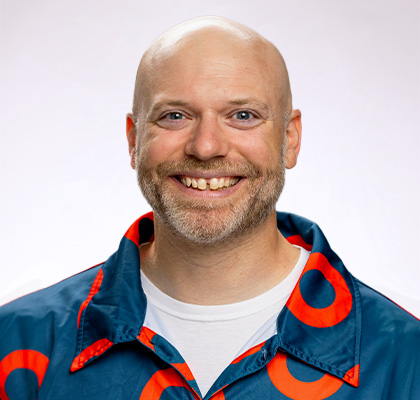
Kevyn Juneau
Associate Professor, Conservation and Environmental Science
Office: 303 Ag Science Building
Phone: 715-425-4958
Email: kevyn.juneau@uwrf.edu
Professional Information
Education:
B.S., State University of New York at Plattsburgh (Biological Sciences)
M.S., University of Florida (Entomology and Nematology)
Ph.D., Michigan Technological University (Forest Science)
Courses Taught:
ESM 105: Introduction to Environmental Science
ESM 109: Introduction to Forestry
ESM 343: Forest Restoration and Management
ESM 242: Tropical Restoration Experience
Professional Bio:
My areas of specialty include: Forest Ecology and Management; Forest Restoration and Conservation; Invasive Plant Ecology and Management. I hold 3 professional certifications: Certified Ecologist - Ecological Society of America; Assistant Laboratory Animal Technician - American Association for Laboratory Animal Science; Commercial Pesticide Applicator. Aquatic, Demonstration & Research. I am a member of the Ecology Research as Education Network (EREN).
Professional Websites:
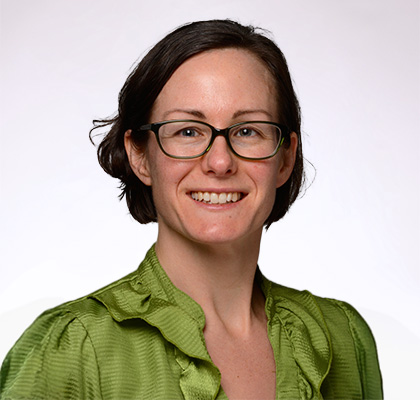
Veronica Justen
Professor, Crop Science
Office: 307 Ag Science Building
Phone: 715-425-4312
Email: veronica.justen@uwrf.edu
Professional Information
Education:
B.S., University of Wisconsin-Madison (Horticulture and Agronomy)
M.S., University of Wisconsin-Madison (Plant Breeding and Genetics)
Ph.D., University of Minnesota-Twin Cities (Applied Plant Sciences)
Courses Taught:
CROP 257: Genetics
CROP 266: Corn and Soybean Production
CROP 267: Small Grain Production
CROP 368: Sustainable Agriculture
CROP 380: Crop Judging
CROP 410: Plant Breeding and Crop Improvement
Professional Bio:
My research interests are in the areas of crop improvement and agricultural practices that will improve the sustainability of regional cropping systems. Particularly, I am interested in identifying ways to diversify crop rotations and exploring alternative uses for row crops. I also am interested in social issues that affect agricultural systems including the role of migrant labor in supporting agricultural production. I serve on several university committees that support my professional interests including the Sustainability Working Group and Diversity and Inclusivity Committee. I also advise student clubs including the Crops and Soils Club and Falcon 4-H and coach the UW-River Falls Crop Judging team.
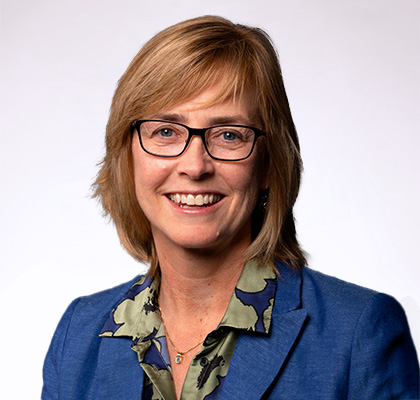
Sonja Maki
Associate Professor, Horticulture
Office: 306 Ag Science Building
Phone: 715-425-4292
Email: sonja.maki@uwrf.edu
Professional Information
Education:
B.S., University of Wisconsin-River Falls (Plant Science)
M.S., University of Minnesota-Twin Cities (Horticulture - Plant Physiology)
Ph.D., University of Minnesota-Twin Cities (Horticulture – Plant Physiology, Cell Biology)
Courses Taught:
HORT 169: Introduction to Horticulture
HORT 245: Interior Plantscapes
HORT 255: Turfgrass Science and Management
HORT 268: Native and Adapted Herbaceous Perennials
HORT 270: Internship I
HORT 310: Greenhouse Management
HORT 370: Internship II
HORT 420: Floriculture
HORT 430: Hydroponic Production of Horticultural Food Crops
CROP 435: Crop Physiology
Professional Bio:
Dr. Maki works with horticultural crops with a specialization in plant growth regulation and flowering. Her masters and doctoral research focused on the role of gibberellins in fruit growth and her post-doctoral research utilized developmental genetics to investigate inflorescence architecture. She enjoys working with students in the Horticulture Society and on projects such as plant growth regulation, hydroponic production of horticultural crops and analyzing the expression of flowering genes through quantitative real time PCR and transcriptomics. Dr. Maki is a member of the American Society of Plant Biologists, the American Society for Horticultural Science and the honorary horticulture fraternity Pi Alpha Xi. Over her career she’s received the Chancellor’s Award, a Doctoral Dissertation Award, several photography awards from the Paul Thomas / Pi Alph Xi Digital Photography Contest and a Science Magazine IBI Series award.
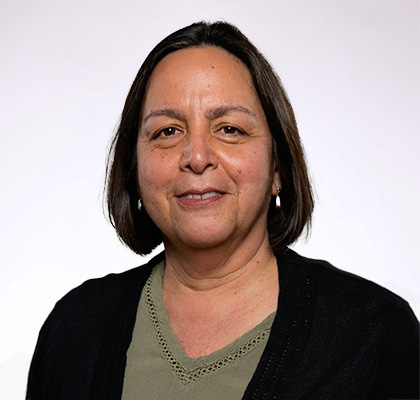
Yoana Newman
Professor, Crop Science
Office: 312 Ag Science Building
Phone: 715-425-4458
Email: yoana.newman@uwrf.edu
Professional Information
Education:
M.S., University of Florida (Agronomy)
Ph.D., University of Florida (Agronomy)
Courses Taught:
Plant Science 161: Introduction to Plant Science
Crop Science 262: Equine Forage Systems
Crop Science 263: Forage Crop Production
Crop Science 287: Tropical Agriculture, Culture, and Environment
Crop Science 363: Pasture Production
Crop Science 381: Forage Experiential Learning
Crop Science 485: Agronomy Seminar
Professional Bio:
My background includes training as a Forage Agronomist and my role includes 70% teaching, and 30% Outreach and Extension Education.
Areas of specialization are Forage Crops, Forage Physiology and Climate Change, Forage Quality, and Grazing Management.
Professional/research activities have focused on i) Evaluation of summer annuals/cool-season forages and soil health for the upper Midwest, ii) Forage evaluation using NIR, and haylage production, iii) Training and development of new professionals in forages/cover crops, grazing and soil health and iv) Education about Tropical Agriculture, Culture and Environment.
Among the awards/accomplishments received are i) Paul B. and Robert Dykstra award for Faculty Excellence – UWRF (2022), ii) Nomination for Distinguished Teacher Award, UWRF (2022), iii) National Champions (2024, 2022, 2020, 2019) - Forage Bowl at American Forage and Grassland Council, UWRF Forage Team, iv) I have authored outreach publications (72), in addition to refereed publications: Book chapters (7), Monographs (2), Journals and Proceedings (42).
Languages: English - Native Proficiency. Spanish – Native Proficiency
Professional Website:
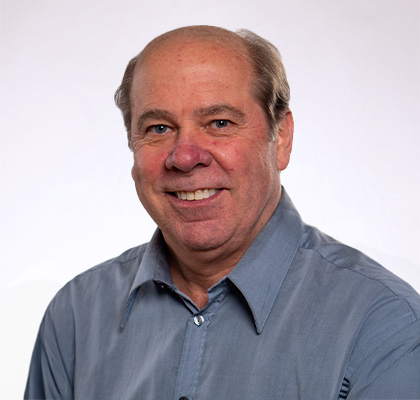
Eric Sanden
Professor, Academic Director of Sustainable Management Program; Director, CAFES Internship Program
Office: 300 Ag Science Building
Phone: 715-425-4578
Email: eric.m.sanden@uwrf.edu
Professional Information
Education:
B.S., Colorado State University (Range Ecology, Concentration in Wildlife Management, Specialization in Soil Science)
M.S., Colorado State University (Range Science)
Ph.D., Texas Tech University (Range Science)
Courses Taught:
ESM 105: Introduction to Environmental Studies
ESM 151: Introduction to Land Use Theory and Practice
ESM 270/370: Internship I/Internship II
ESM 245: Foundations of Ecological Restoration
ESM 300/500: Environmental Education
ESM 302: Broadfield Environmental Education Lab
ESM 303: Environmental Policies and Administration
ESM 333: Remote Sensing of Natural Resources
ESM 345: Prairie Restoration and Fire Ecology
ESM 363: GIS Applications in Resource Management
ESM 393: Comprehensive Planning
ESM 435/735: Advanced Land Use Planning and Design
ESM 485: Senior Seminar
SMGT 115: Environmental Science and Sustainability
Professional Bio:
Education: Undergraduate academic background in natural resources management, focused on grassland ecology. Employed with the Natural Resources Conservation Service at field stations throughout Colorado upon graduation. Graduate studies focused on the use of advanced technologies in natural resources management, including the early application of GIS to modelling wind and water erosion potential and change over time and the development of the scene brightness index to measure total vegetative ground cover utilizing remote sensing technologies.
Professional Activities : Curricular development and instruction in natural resources management, land use planning, remote sensing, GIS, and environmental education programs. Multi-campus collaborative research utilizing student participants in cost-of-community services studies. Administrative duties including academic director of the Sustainable Management collaborative, online bachelor’s degree program and PES faculty coordinator and director of the CAFES internship program. Long-standing member of the Pierce County Land Management Committee.
Awards:
UWRF Adviser of the Year Award, 2019
McNair Scholars Program Diversity Award, 2015
UWRF CAFES Outstanding Faculty Award, 2015
North American Colleges and Teachers of Agriculture Teaching Award of Merit, 2015
Project Learning Tree Wisconsin Facilitator of the Year, 2015-2016
Raymond Davies Scholarship from Society for Imaging Science and Technology, 1990
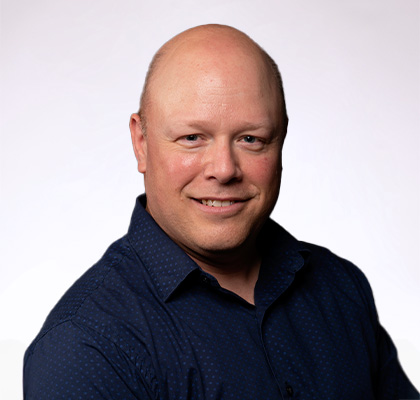
Kevin Thaisen
Assistant Professor, Geology
Office: 313 Ag Science Building
Phone: 715-425-4679
Email: kevin.thaisen@uwrf.edu
Professional Information
Education:
- B.S., University of Texas (Geology)
- M.S., Indiana University (Geology)
- Ph.D., University of Tennessee (Geology)
Courses Taught:
GEOL 101: Introduction to Geology
GEOL 102: Introduction to Geology Lab
GEOL 202: Oceanography
GEOL 230: Mineralogy
GEOL 231: Petrology
GEOL 350: Geological Destinies of Nations
GEOL 269: Environmental Geology
GEOL 305: Geology of the Planets
GEOL 371: Regional Field Trips
GEOL 485: Senior Seminar
Expedition to the Great Lake Michigan (Summer course in conjunction with UW-Milwaukee)
Professional Bio:
Dr. Thaisen is a Planetary Geologist who has done work here on Earth and in its oceans, on the Moon, Mars, Venus and with meteorites. He is currently working with undergraduate students on micrometeorites/micrometeor-wrongs using a scanning electron microscope to determine morphological and compositional features that will aid in proper identification.
Professional Website:
Ashani Thilakarathne
Assistant Professor, Soil Science
Office: 309 Ag Science
Phone: 715-425-4793
Email: ashani.thilakarathne@uwrf.edu
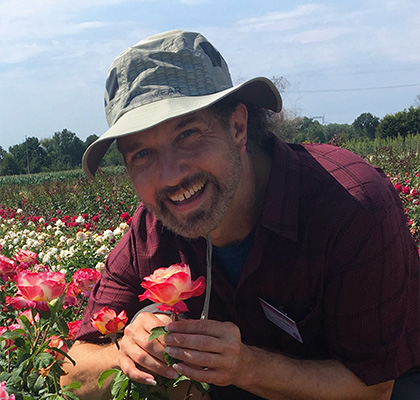
David Zlesak
Professor, Horticulture
Office: 305 Ag Science Building
Phone: 715-425-4415
Email: david.zlesak@uwrf.edu
Professional Information
Education:
B.S., University of Wisconsin-River Falls (Horticulture)
M.S., University of Minnesota (Plant Breeding)
Ph.D., University of Minnesota (Applied Plant Sciences; Plant Breeding and Molecular Genetics track)
Courses Taught:
PLSC 120: Plants and Society
PLSC 161: Introduction to Plant Science Laboratory
AFES 222 Introduction to Biotechnology
HORT 200: Plant Propagation
HORT 352: Woody Landscape Plants
HORT 369: Plant Tissue Culture
HORT 452: Arboriculture and Nursery Management
HORT 485: Horticulture Senior Seminar
HORT 490: Horticulture Independent Study
Professional Bio:
Dr. Zlesak (or Dr. Z) has a deep care for his students and colleagues and an ever-deepening passion for plants. Selected as UWRF's 2017 Distinguished Teacher, David loves to get to know his students and help them build upon their foundational knowledge/skills in horticulture and explore their unique career interests. Working in greenhouse/nursery production and sales, with pines at the USDA Forest Service and as a Horticulture Extension Educator with the Master Gardener program and industry members, he brings a wealth of background and connections to support curriculum and student opportunities. David has been breeding hardy landscape roses since his youth and continues to breed them for increased winter hardiness and disease resistance. He works with faculty at other universities to study disease resistance genes and reproductive biology of roses. He serves as the current president of the American Rose Trials for Sustainability® program, a national program that tests roses under low input conditions and provides regional awards. He is also currently cochair of the USDA National Clean Plant Network-Roses program that aims to bring virus indexed propagation material to support industry and the final consumer with clean plants. Besides roses, he also loves to work with native shrubs and perennials and has cultivars of the following US native species on the market: ninebark, red twig dogwood, heliopsis, and smooth hydrangea. His desire in his plant breeding efforts is to overcome market limiting traits to support the horticulture industry and consumers (e.g., plants that are more disease resistant, bloom abundantly and have more attractive/manageable plant habits, are production friendly, etc.). His plants have earned awards for their strong performance as has David for his contributions to education and horticulture (University of Minnesota Horticulture Dept. Distinguished Alumnus, Bronze award from both the Wisconsin Federation of Garden Blubs and Minnesota State Horticulture Society, etc.). David is a frequent speaker and contributor to horticulture industry and academic organizations.
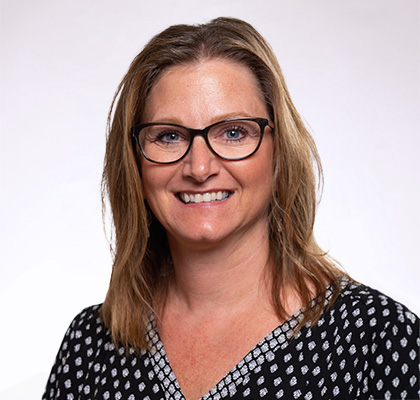
Christina Killen
Academic Department Associate, Plant and Earth Science
Office: 324 Ag Science Building
Phone: 715-425-3910
Email: christina.killen@uwrf.edu
Professional Information
Education:
B.S., University of New Hampshire (Biochemistry)
M.Ed., University of Minnesota (Secondary Science Education)
Professional Bio:
I started my career at a Junior Scientist at the University of Minnesota where I conducted cataract research for three years. After completing my master’s degree, I went on to teach secondary biology and earth science for eight years at Tartan High School in Oakdale, Minn. After that, I managed the Cell Lab exhibit at the Science Museum of Minnesota for fifteen years, teaching high school students lab skills and assisting visitors with hands-on molecular biology experiments. In the fall of 2019, I joined the Plant and Earth Science Department at UWRF as an Academic Department Associate in the front office. I enjoy being immersed in an academic setting, surrounded by rocks and plants and providing administrative support to our faculty and students.
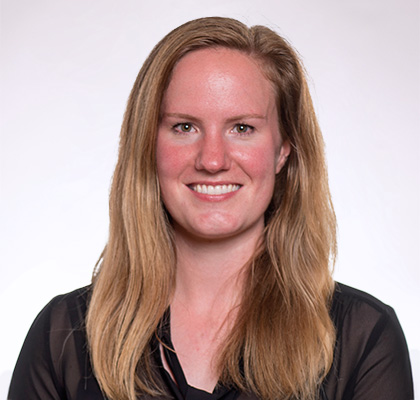
Kelsey Cowart
Ecological Restoration Institute Program Manager
Office: 223A Ag Science Building
Phone: 715-425-4930
Email: kelsey.cowart@uwrf.edu
Professional Information
Education:
B.S., University of Minnesota – Twin Cities (Biology)
M.S., University of Minnesota – Twin Cities (Biological Sciences focused in Conservation Biology and Ecology)
Professional Bio: Background in wildlife research with data entry about carnivore tracking in the Serengeti and acoustic preferences of mating gray treefrogs. Conservation practices in managing invasive species, prairies and forests with an emphasis in supporting wildlife including pollinators and reptiles. Background in education as an interpretive naturalist and high school coach.
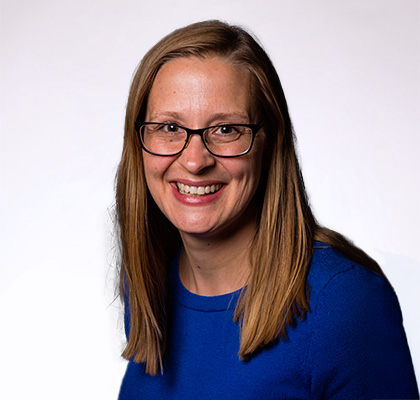
Heather Davis
Laboratory Manager, Plant and Earth Science Department
Office: 223C Ag Science Building
Phone: 715-425-4518
Email: heather.sumnerdavis@uwrf.edu
Professional Information
Education:
B.S., University of Wisconsin-River Falls (Psychology/Business/Geology)
M.S., University of Wisconsin- Madison (Water Resource Management)
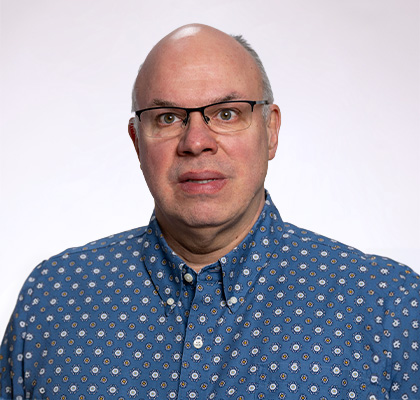
Kurt Spokas
DIH Analytical Lab Manager
Office: Ag Science 223C
Phone: 715-425-4279
Email: kurt.spokas@uwrf.edu
Professional Information
Education:
B.S., University of Wisconsin-River Falls (Horticulture)
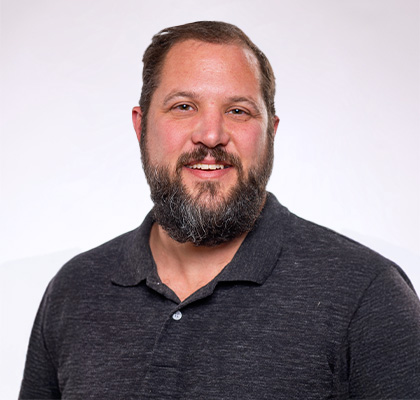
Dan Waletzko
Greenhouse and Field Plot Manager
Office: 102 Greenhouse
Phone: 715-425-4709
Email: daniel.k.waletzko@uwrf.edu
Professional Information
Education:
B.S., University of Wisconsin-River Falls (Horticulture)

